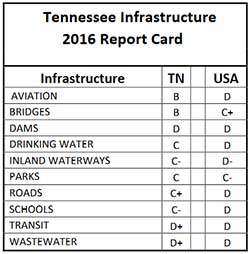Tennessee section of ASCE: Infrastructure GPA is a C
Two Vanderbilt civil engineering professors helped grade Tennessee’s infrastructure, and the report card came home today.
Professors Lori Troxel and Craig Philip and Vanderbilt engineering students were members of a team of professional engineers across Tennessee that assessed 10 categories of the state’s infrastructure, resulting in an overall grade point average of C. The Tennessee Section of the American Society of Civil Engineers released its 2016 Report Card for Tennessee’s Infrastructure at a press event Sept. 27 at the Nashville International Airport.
The 10 categories are:
- Aviation: B-
- Bridges: B
- Dams: D
- Drinking Water: C
- Inland Waterways: C-
- Parks: C
- Roads: C+
- Schools: C-
- Transit: D+
- Wastewater: D+.
The last Report Card for Tennessee’s Infrastructure, released in 2009, also gave the state’s infrastructure a GPA of C.

Troxel and Philip assessed Inland Waterways. Troxel is an associate professor of the practice of civil and environmental engineering and faculty adviser of the Vanderbilt chapter of the ASCE. Philip is a research professor of civil and environmental engineering and director of the Vanderbilt Center for Transportation Research.
Specific to the state’s inland waterways, budget cuts and depleted funds in the federal Inland Waterways Trust Fund threaten to set back Tennessee’s water transportation infrastructure, including the new Chickamauga Lock, Tennessee’s biggest water infrastructure project. Repairs also are needed on locks at Melton Hill, Nickajack, Pickwick and Watts Barr.
Sixteen students in Troxel’s undergraduate environmental engineering class – Sustainable Development – wrote the report. “They condensed complicated data into an easy-to-understand analysis. Professor Philip and I served as supervisors and editors, responding to comments and checking for accuracy,” Troxel said.
“The students took statistics and narratives about every lock and dam and inland port in Tennessee and wrote a summary. Tennessee’s locks are often delayed due to unscheduled repairs and repairs can take multiple months to completely resolve,” Troxel said.

“If the condition of Tennessee’s locks is not improved, freight will have to be transported by highway and rail systems. This will raise transportation costs and place additional stress on pavement and bridge infrastructure and the highway system,” said Philip.
The 2016 Report Card for Tennessee’s Infrastructure finds that much of the state’s infrastructure requires investment and upgrades to keep up with its growing population and infrastructure demands. Of further note:
- The state is home to the lowest number of bridges that are both structurally deficient and functionally obsolete of all the southeastern states.
- Tennessee is home to 576 farm pond dams that are exempt from regulation and regular inspection requirements.
- The U.S. Environmental Protection Agency estimates $2.7 billion for Tennessee’s 20-year drinking water infrastructure needs.
- Increasing traffic levels around the state cause significant delays. Each year, the average driver in Tennessee’s large urban areas loses significant time to traffic congestion: Chattanooga: 28 hours; Knoxville: 35 hours; Memphis: 43 hours, and Nashville/Davidson: 45 hours.
- While Tennessee’s roads are in superior condition when compared to neighboring states, current funding will not keep pace with demand and deteriorating performance, with an estimated $475 million necessary each year.
- The U.S. EPA Clean Water Needs Survey shows an overall need of $2.6 billion for Tennessee’s wastewater infrastructure.
Given these infrastructure challenges, the Tennessee Section of the American Society of Civil Engineers urges a number of recommendations to raise the grades, including:

Finding sustainable solutions that will help Tennessee build a transportation network for the future; leveraging infrastructure investments to help manage the impact of expected population growth; leveraging the state’s central location as a transportation hub; raising awareness of the true cost of water; and lessening the unknowns about the state’s farm pond dams.
The Report Card for Tennessee’s Infrastructure was created as a public service to citizens and policymakers of the state to inform them of the infrastructure needs in their community. ASCE state and regional Infrastructure Report Cards are modeled after the national Report Card for America’s Infrastructure, which gave America’s infrastructure a grade of D+ in 2013.
Janey Camp, research associate professor of civil and environmental engineering, serves as a member of the ASCE’s national committee on America’s Infrastructure. That committee reviews all state report cards prior to their release. Camp helped recruit volunteers to work on the state report card project and served on the coordinating committee that staged the Tennessee ASCE news release event.
To view the full Tennessee report, visit http://www.infrastructurereportcard.org/tennessee
Contact:
Brenda Ellis, (615) 343-6314
Brenda.Ellis@Vanderbilt.edu
Twitter @VUEngineering